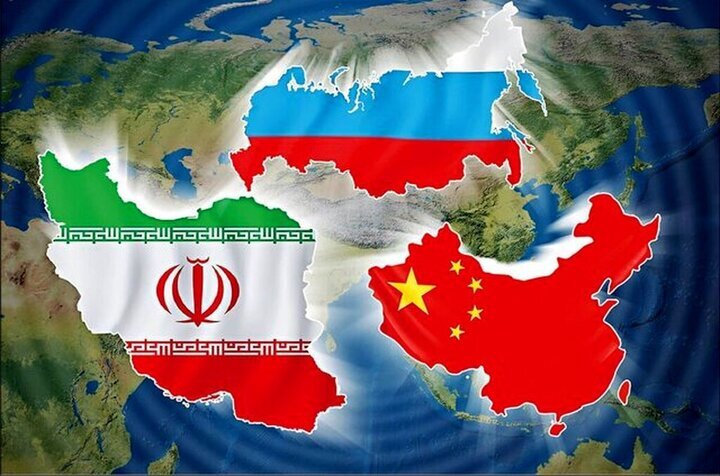The ripple effects of a potential Iranian war crisis on Russia and China

TEHRAN – The strategic cooperation between Russia, China, and Iran, often labeled by Western powers as the "Axis of Upheaval," has emerged as a critical counterweight to Western influence, particularly that of the United States. This informal yet pivotal partnership is rooted in shared objectives: opposing American unipolarity, safeguarding national sovereignty, and expanding influence across strategic regions.
With its strategic location and vast energy resources, Iran serves as a linchpin within this axis, acting as a vital ally for Russia and a key energy and transit hub for China. Both Russia and China have championed Iran's integration into frameworks like the Shanghai Cooperation Organization (SCO) and BRICS, viewing it as a bulwark against Western sanctions. Thus, if Iran becomes embroiled in a war crisis or faces intensified external threats, particularly from Western pressures or regional conflicts, it could significantly disrupt the global and regional balance of power, with profound consequences for both Russia and China.
Beijing's precarious pivot
A war crisis or heightened external threats to Iran would pose significant risks to China's economic and strategic interests. Despite its deep economic ties with the West and Israel, China prioritizes diplomatic and political support for Iran over direct military involvement.
Iran is central to China's energy security, supplying approximately 90% of its crude oil exports to China, averaging 1.4 to 1.7 million barrels per day (bpd) in 2025, peaking at 1.8 million bpd in June 2025. These discounted supplies, a byproduct of Western sanctions, are critical for China, the world's largest oil importer. A crisis in Iran would disrupt this vital supply chain, compelling China to seek costlier or less reliable alternatives, potentially hampering economic growth. Additionally, non-oil trade between Iran and China, valued at $32.3 billion in 2024, would face severe constraints.
Iran is a "key gateway" for China's Belt and Road Initiative (BRI), facilitating connections to European and West Asian markets. A war crisis or external threats disrupting Iran's transport and energy corridors would jeopardize China's major infrastructure projects and critical logistical routes to the West. Events like the June 2025 attacks on Iranian military and nuclear facilities by Israel could further threaten strategic projects such as the China-Pakistan Economic Corridor (CPEC). The "Middle Corridor" (Trans-Caspian International Transport Route), an alternative to routes through Iran or Russia, suffers from infrastructural limitations, including limited transport capacity, making it an inadequate substitute for Iran's role in China's BRI objectives.
Geopolitically, a crisis in Iran would undermine China's diplomatic credibility, particularly after its successful mediation of the Iran-Saudi Arabia rapprochement in March 2023. It would also compromise China's strategic autonomy in securing energy and logistical routes, increasing vulnerability to external pressures, particularly in choke points like the Strait of Malacca, which remain under significant American influence. This would diminish China's regional and global standing, creating opportunities for the West to bolster its position and potentially shift focus toward directly confronting China.
Moscow's shifting strategic compass
For Russia, a war crisis or external threats to Iran would have far-reaching consequences, affecting its geopolitical influence, economic stability, and security interests.
A crisis in Iran would weaken Russia's ability to maintain its regional foothold, potentially creating a power vacuum exploitable by rival actors like Turkey or Saudi Arabia. In a worst-case scenario, such as a severe escalation of conflict, increased instability, ethnic tensions, or a refugee crisis could spill over into Central Asia and the Caucasus, heightening risks of terrorism, migration, and anti-Russian sentiment in these critical regions.
Economically, while Russia, a major oil exporter, might temporarily benefit from rising global oil prices due to disruptions in Iranian supply, long-term market volatility would undermine cooperation within OPEC+ on oil production and price stabilization. Iran is also believed to be a market for Russian weaponry, and a crisis would likely reduce demand for Russian defense exports, impacting its defense industry. Furthermore, Iran is integral to Russia's access to Asian markets, particularly India, via transport corridors.
The International North-South Transport Corridor (INSTC), connecting Russia, Iran, and India, is a cornerstone of Russia's strategy to diversify trade routes and reduce reliance on Western-controlled passages. A crisis in Iran would jeopardize the INSTC's viability, disrupting Russia's access to South Asian markets and exacerbating challenges posed by sanctions related to the Ukraine conflict. A direct conflict involving Iran could further render these routes insecure, blocking Russian exports.
Politically, Iran serves as a geopolitical buffer against Western pressure, particularly in the context of the Ukraine conflict. A crisis in Iran would embolden the West, potentially intensifying Russia's isolation and weakening its narrative against Western imperialism.
In conclusion, a war crisis or intensified external threats to Iran would have profound and multifaceted consequences for both China and Russia. The loss of a critical strategic partner would erode their regional influence and geopolitical leverage against the West. Key energy and transit routes would face disruptions, neighboring regions would see increased instability, and both nations would encounter significant challenges to their economic and security interests.
The Axis would be severely undermined, creating opportunities for the West to expand its influence. Should the U.S. overcome the challenge posed by Iran, it could redirect resources to confront China and Russia more directly, with Russia facing the added threat of intensified NATO pressure, particularly in the context of renewed Western support for Ukraine. This scenario would force both nations to reassess their geopolitical and economic strategies, grappling with significant obstacles to maintaining their strategic balance and global influence.
By Mohammad Hossein Masoumzadeh, Senior Researcher at GPTT
Leave a Comment